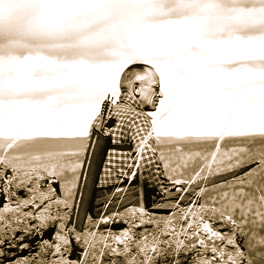The year before his death in 1949, Aldo Leopold published A Sand County Almanac, a book to be read as much for its prose as its philosophy. Leopold’s writing is surpassingly fluent, leathery, vivid. A favorite passage: “One swallow does not make a summer, but one skein of geese, cleaving the murk of a March thaw, is the spring.”
Leopold called for a “land ethic,” an evolution of ethics that balanced the interests of the biotic community with human desires. He understood that the cultural values that underpinned public and private action had to be reworked if there was to be any hope of slowing the decimation of America’s wilderness.
Leopold sought not only to shape ethics, but aesthetics. He recognized a paradox at the heart of conservation—that the more people are drawn to the wilderness, the more they tread upon it. He advocated uses of the land that would enhance its admiration while leaving sufficient wilderness for study and preservation.
Today, the successes of American environmentalism are uneven. The law remains obsessed with land as commodity, held in fee simple absolute. Yet Leopold still amazes, with the equipoise of prose and the depth of his thinking.

